Donald J. Robertson's Blog, page 22
February 7, 2024
Talking to the Street Stoics about Marcus Aurelius
Had a great conversation recently with the Street Stoics. Check out Buzzsprout or the links below for the episode.

Stoicism: Philosophy as a Way of Life is a reader-supported publication. To receive new posts and support my work, consider becoming a free or paid subscriber.
February 6, 2024
Out Now – Marcus Aurelius: The Stoic Emperor
Today is the official release date of my latest book, Marcus Aurelius: The Stoic Emperor. If you have already pre-ordered a copy you should receive it very soon, if you haven’t already. Otherwise, you can now order the ebook or hardback online from Amazon and all good booksellers, at least in the US/Canada and some other regions. (UK pub date is March 26th.) The audiobook, which I recorded before Christmas, will be available very soon. Early reviews have already started appearing on Goodreads. Thanks once again, everyone, for your support!
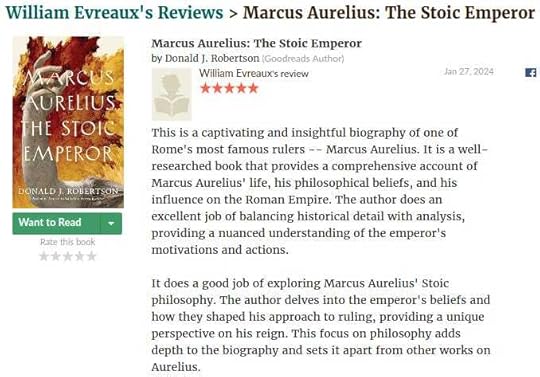
To celebrate the release we’re having a virtual book launch event on Facebook Live at 7pm EST tonight. Everyone is invited. I believe you can attend even if you don’t have a Facebook account. If you’re unable to attend live, register now and you’ll be able to watch the video recording afterwards. However, those of you who are able to join us live will have the opportunity to ask questions and join our competition for a chance to win a signed copy of the book. I’ll also be reading an excerpt from the book and discussing Marcus Aurelius’ life and philosophy.

Stoicism: Philosophy as a Way of Life is a reader-supported publication. To receive new posts and support my work, consider becoming a free or paid subscriber.
February 5, 2024
Reviews of Marcus Aurelius: The Stoic Emperor
Tomorrow (6 Feb) is the publication date of my new book, Marcus Aurelius: The Stoic Emperor. It’s been quite a long journey since James Romm, my editor, invited me to submit a proposal for Yale University Press’ Ancient Lives series.
There are already several biographies of Marcus Aurelius but I had been asked to write one that focused more on his character as an individual. It’s unusual that a non-academic would be asked to author one of these books. My background is in psychotherapy and philosophy rather than classics or history. I felt that previous attempts could have said a lot more about how Stoic philosophy guided his actions, and so I approached writing this book as if it were more like what I’d describe as a philosophical biography. If you want to learn more, join us tomorrow for the Facebook Live launch event. (As far as I’m aware you don’t need a Facebook account to attend.)
I’m pleased to say the book will be released tomorrow in the US and Canada, and is currently available for pre-order. It’s in hardback, ebook, and also the audiobook that I narrated. The book has consistently been at the top of the Amazon New Release charts. Also, Barnes and Noble made it an online staff pick and added the following Bookseller Note:
“Addictively written, this riveting visitation of the fascinating figure of Marcus Aurelius is as comprehensive as it gets, covering everything from his reign to his philosophy.” — Barnes and Noble
Some readers received advance copies and have already posted reviews on Goodreads, which I’ve shared below.
Stoicism: Philosophy as a Way of Life is a reader-supported publication. To receive new posts and support my work, consider becoming a free or paid subscriber.
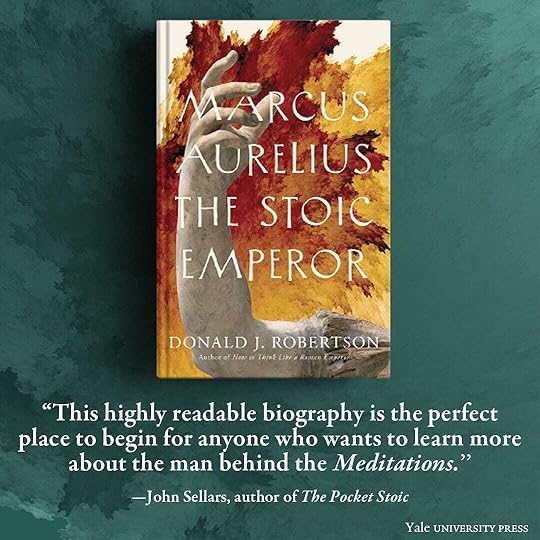 Some Early Reviews
Some Early ReviewsDonald Robertson is one of the world’s leading experts on Marcus Aurelius and his extensive knowledge coupled with a profound passion for Stoicism is self-evident from every page of the book. Unlike other history books that often overwhelm the reader with an overabundance of minute details, Marcus Aurelius: The Stoic Emperor skilfully and almost inconspicuously weaves them into a broader narrative making the story so much more alive and memorable. — Eryk Jan
This is a well written book: easy to read. The author uses text from Meditations to show how Marcus would have thought or responded while maintaining focus on the story. It seems well researched despite the dearth of contemporaneous sources. When the history is not clear, the author discusses the opinions of other scholars instead of just giving us what he thinks. — John
This is a captivating and insightful biography of one of Rome's most famous rulers — Marcus Aurelius. It is a well-researched book that provides a comprehensive account of Marcus Aurelius' life, his philosophical beliefs, and his influence on the Roman Empire. The author does an excellent job of balancing historical detail with analysis, providing a nuanced understanding of the emperor's motivations and actions. It does a good job of exploring Marcus Aurelius' Stoic philosophy. The author delves into the emperor's beliefs and how they shaped his approach to ruling, providing a unique perspective on his reign. This focus on philosophy adds depth to the biography and sets it apart from other works on Aurelius. — William Evreaux
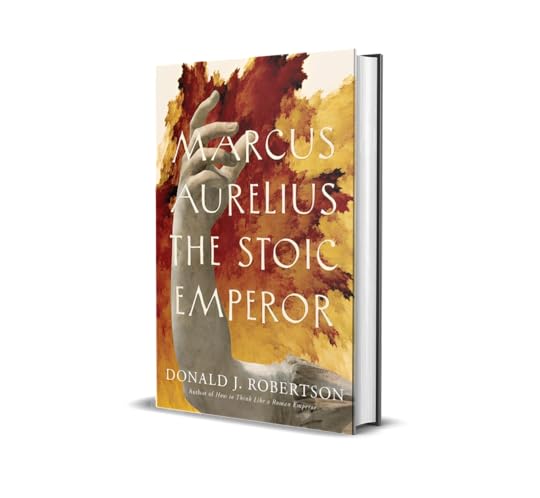
Thank you for reading Stoicism: Philosophy as a Way of Life. This post is public so feel free to share it.
February 3, 2024
Video: How Stoic was Marcus Aurelius?
Marcus Aurelius is generally regarded as one of the "Five Good Emperors" and is often praised for his Stoic philosophy, particularly as expressed in the Meditations. However, like any historical figure, he is not without criticisms both in his own time and in ours... Are these insignificant or do they conflict with his values as a Stoic philosopher?
Watch this video of our lively panel discussion, chaired by Anya Leonard of and featuring me, Angie Hobbs, and Massimo Pigliucci.
Stoicism: Philosophy as a Way of Life is a reader-supported publication. To receive new posts and support my work, consider becoming a free or paid subscriber.
Angie Hobbs gained a degree in Classics and a PhD in Ancient Philosophy at the University of Cambridge and in 2012 she was appointed Professor of the Public Understanding of Philosophy at the University of Sheffield. She is author of many books, including’ Plato and the Hero’ (C.U.P) and ‘Plato’s Republic: a Ladybird Expert Book’. She contributes regularly to radio and TV programmes and other media, including 26 appearances on In Our Time on Radio 4. She has spoken at the World Economic Forum at Davos, the Houses of Parliament, the Scottish Parliament and Westminster Abbey and been the guest on Desert Island Discs, Private Passions and Test Match Special and has most recently been filmed with Mary Beard discussing Marcus Aurelius. You can follow Angie on Twitter and learn more about her at angiehobbs.com.
Massimo Pigliucci is an author, blogger, podcaster, as well as the K.D. Irani Professor of Philosophy at the City College of New York. His academic work is in evolutionary biology, philosophy of science, the nature of pseudoscience, and practical philosophy. Massimo publishes regular columns in Skeptical Inquirer and in Philosophy Now. His books include ‘How to Be a Stoic: Using Ancient Philosophy to Live a Modern Life’ (Basic Books) and ‘Nonsense on Stilts: How to Tell Science from Bunk’ (University of Chicago Press). Massimo’s latest book is ‘The Quest for Character: What the Story of Socrates and Alcibiades Teaches Us about Our Search for Good Leaders’ (Basic Books). More by Massimo at newstoicis.org.
Donald Robertson is an author and psychotherapist, specializing in the relationship between modern cognitive-behavioral therapy (CBT) and ancient Greek philosophy. He is one of the founding members of the Modern Stoicism organization and the author of three books on Marcus Aurelius. ‘How to Think Like a Roman Emperor’, a self-help book; 'Verissimus: The Stoic Philosophy of Marcus Aurelius', a graphic novel; and, most recently, a biography titled 'Marcus Aurelius: The Stoic Emperor' due to be released by Yale University Press as part of their Ancient Lives series on February 6th. He has also edited the Capstone Classics edition of the ‘Meditations’ and contributed a chapter on Marcus Aurelius and psychotherapy to the forthcoming 'Cambridge Companion to Marcus Aurelius' Meditations.' Donald is also the president and founder of the Plato's Academy Centre nonprofit, based in Greece.
Moderated by Anya Leonard, the founder and Director of Classical Wisdom, a site dedicated to bringing ancient wisdom to modern minds. Author of the children’s book, "Sappho: The Lost Poetess", dedicated to the life, works and remarkable recent discovery of a poem written by the 7th century Poetess, Sappho, Anya has also recently launched Classical Wisdom Kids, a program bringing ancient wisdom to future minds. Check out her website Classical Wisdom's Books.

Stoicism: Philosophy as a Way of Life is a reader-supported publication. To receive new posts and support my work, consider becoming a free or paid subscriber.
February 1, 2024
Was Marcus Aurelius Murdered?
 Publicity still reproduced under fair use rules. © 2000 Dreamworks LLC & Universal Pictures.
Publicity still reproduced under fair use rules. © 2000 Dreamworks LLC & Universal Pictures.[This article was previously published on Medium.]
In the first act of Ridley Scott’s Gladiator (2000), Marcus Aurelius, the Roman emperor famous for being a Stoic philosopher, is portrayed by the actor Richard Harris. In the movie, Marcus is shown being smothered to death by his son, Commodus, played by Joaquin Phoenix. But is that really what happened?
Stoicism: Philosophy as a Way of Life is a reader-supported publication. To receive new posts and support my work, consider becoming a free or paid subscriber.
In reality, Commodus was appointed co-emperor three years before Marcus Aurelius died…
Gladiator, of course, is a work of fiction, only loosely based on the historical evidence. For example, in the movie, Commodus is Caesar, and only becomes emperor as a result of his father’s death. In reality, Commodus was appointed co-emperor three years before Marcus Aurelius died, and they ruled side-by-side during this time.
Most modern historians believe that Marcus died from some contagious disease, perhaps the Antonine Plague, a devastating pandemic named after his imperial dynasty, the Antonines. This broke out in 166 CE and claimed many lives, probably including several people close to Marcus. Some modern scholars believe it may have been a form of the smallpox virus, although it’s difficult to know for certain.
The Historia RomanaGladiator’s idea that Commodus may have murdered his father does find a little bit of support in one of the Roman histories, known as the Historia Romana. Its author, Cassius Dio, a historian who served as a senator under Commodus, actually suggests that Marcus may have been murdered, albeit not by his son’s hand.
[Marcus Aurelius] passed away on the seventeenth of March, not as a result of the disease from which he still suffered, but by the act of his physicians, as I have been plainly told, who wished to do Commodus a favour. — Cassius Dio
Dio appears to mean that Marcus’ physicians hastened his death, perhaps by giving him opium or another drug, hoping that Commodus would thank them for this. If Marcus seemed already to be dying, his physicians may have viewed this as an act of euthanasia rather than murder — although Dio implies that it was not done at Marcus’ behest. Moreover, it’s unclear how hastening his father’s death would benefit Commodus, unless perhaps the physicians thought it was possible Marcus might survive.
We should note that Dio reports this as hearsay, although he seems convinced that it’s true. All of the other ancient historians are content to attribute Marcus’ death to his illness. So the rumors of murder are not usually taken very seriously by modern historians.
Curiously, Dio proceeds to emphasize that Marcus took steps to ensure that Commodus would not be accused of causing his death.
When now he was at the point of death, he commended his son to the protection of the soldiers (for he did not wish his death to appear to be due to Commodus). — Cassius Dio
When a powerful Roman died, especially an emperor, it was very common for there to be suspicion of foul play. Other contenders for the throne might accuse Commodus of murdering his father, in order to challenge his right to rule. So Marcus was acting quite prudently by placing his son under guard during his final hours. That’s presumably why Dio blames Marcus’ death on the physicians rather than Commodus himself.
Dio’s account of Marcus’ death appears somewhat contradictory, though. We’re told Marcus believed he was “at the point of death”, in which case it’s puzzling why the physicians would feel the need to hasten his demise even further, perhaps only by a day or two. Of course, we can imagine explanations. Perhaps the doctors believed that Marcus was underestimating his ability to pull through. Perhaps they wanted to ensure Marcus died before he issued some last-minute decree, which may have harmed Commodus. It’s difficult to see, though, how Marcus could deny his son the right to succeed him, as in Gladiator, because Commodus was already well-established as emperor. Unfortunately, Dio offers no further explanation of the physicians’ alleged motives.
 Publicity still reproduced under fair use rules. © 2000 Dreamworks LLC & Universal Pictures.The Other Historians
Publicity still reproduced under fair use rules. © 2000 Dreamworks LLC & Universal Pictures.The Other HistoriansA lower ranking government official, called Herodian, also provides a near-contemporary account of Marcus’ death.
When Marcus was an old man, exhausted not only by age but also by labors and cares, he suffered a serious illness while visiting the Pannonians [i.e., in Austria].
He says that Marcus became very weak as a result of the illness, which he endured for several days, until one night he lost consciousness, and died a day or so later. There’s no mention of any foul play.
Neither does our other main source for Marcus Aurelius’ life, the Historia Augusta, make any mention of any allegations that he had been murdered. This text was written several centuries later, although it draws heavily on the writings of earlier historians, closer to the events. Although the Historia Augusta is considered quite unreliable by modern scholars, its chapter on Marcus is believed to be one of the less problematic ones.
It merely states that Marcus died seven days after contracting some unnamed contagious disease, perhaps the Antonine Plague, although it could have been something else. It says Commodus visited him but Marcus had him ”sent away in fear that he would catch the disease”. It also states that Marcus abstained from food and drink in order to hasten his own death from the illness. This was a common form of euthanasia in the ancient world — it was, according to one account, also how Zeno, the founder of Stoicism, chose to hasten his own demise when he became ill in old age.
Then, being eager to die, he refrained from eating or drinking, and so aggravated the disease. — Historia Augusta
This account conflicts somewhat with Dio’s claim that the physicians had hastened Marcus’ demise. According to the Historia Augusta, Marcus actually chose to die, presumably because he was suffering from such severe illness. Why would his physicians risk hastening his death when Marcus was opting for euthanasia anyway?
Moreover, if this is true, Marcus’ intention, once more, may have been to eliminate any suspicion that Commodus, or someone else, had poisoned him. If Commodus was under guard, and Marcus was not consuming any food or drink, it would be difficult to blame him for poisoning or otherwise murdering his father.
According to the Historia Augusta, after his final conversation with Commodus, Marcus simply “covered his head as though he wished to sleep and during the night he breathed his last.”
Another late Roman historian, Aurelius Victor, states that Marcus “was consumed by disease at Bendobona [Vienna] in the fifty-ninth year of his life.” Finally, the Christian historian, Paulus Orosius, says only that “while staying in Pannonia [Austria], he died of a sudden illness.” As you can see, none of these historians blame Commodus, or anyone else, for murdering Marcus. They all attribute his death to the disease.
 Panels depicting the death of Marcus Aurelius from my graphic novel about his life, Verissimus.Conclusion
Panels depicting the death of Marcus Aurelius from my graphic novel about his life, Verissimus.ConclusionSo was Marcus murdered by Commodus? All of the ancient historians appear to agree that Marcus was suffering from a severe illness, a contagious disease, perhaps the Antonine Plague, when he died. Most of them agree that he died from the disease, as we might expect, given that the mortality rate was around one-third. In my recent biography, Marcus Aurelius: The Stoic Emperor (Yale), I therefore blamed Marcus’ death on the plague but also mentioned Dio’s curious allegation.
Marcus Aurelius covered his head, as though going to sleep, and passed away quietly during the night of March 17, 180. He had ordered the Praetorians to guard his son, in order to scotch any rumors that Commodus was responsible for his death. Even so, Cassius Dio in his history insists that the emperor was killed by his own physicians, who wished to win Commodus’s favor by hastening his transition to sole ruler.
Marcus was aged almost sixty and had been in notoriously poor health most of his life. He was perceived as frail and prone to illness, although Cassius Dio considered him curiously resilient despite this. Nevertheless, given his age and physical condition, he was unlikely to survive the plague, if that is indeed what he contracted.
There is a very intriguing passage in the Meditations, which Marcus probably finished writing at least five years before his death.
There is no man so fortunate that there shall not be by him when he is dying some who are pleased with what is going to happen. Suppose that he was a good and wise man, will there not be at least someone to say to himself, “Let us at last breathe freely, being relieved from this schoolmaster? It is true that he was harsh to none of us, but I perceived that he tacitly condemns us.” This is what is said of a good man. But in your own case how many other things are there for which there are many who wish to get rid of you? You will consider this, then, when you are dying, and you will depart more contentedly by reflecting thus: “I am going away from such a life, in which even my associates in behalf of whom I have striven so much, prayed, and cared, themselves wish me to depart, hoping perchance to get some little advantage by it.” — Meditations, 10.36
He seems to anticipate being surrounded by individuals who would be pleased to see him gone, as they are tired of his disapproving looks, and hope to benefit from his death in some way. He doesn’t name Commodus, however, who was probably no older than fourteen when this was written.
We’ll never know for certain what happened, of course. It’s possible that Commodus murdered his father, and had him killed by his physicians. My considered opinion is that we should view Dio’s report merely as a rumor. Marcus probably died of natural causes, as a result of the Antonine Plague, or some other contagious disease.
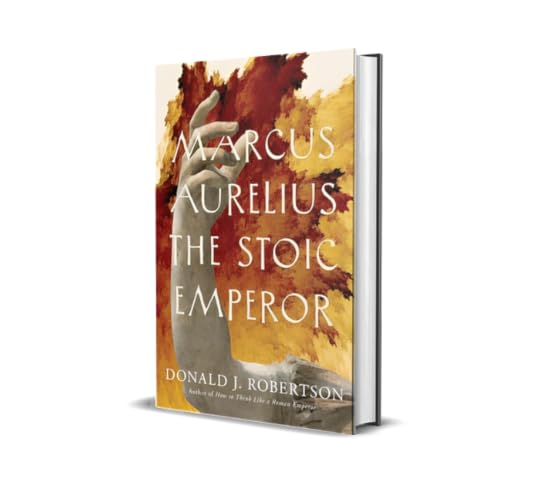
Stoicism: Philosophy as a Way of Life is a reader-supported publication. To receive new posts and support my work, consider becoming a free or paid subscriber.
January 31, 2024
Join me for the virtual book launch of Marcus Aurelius: The Stoic Emperor
I would like to invite you all to join me for the virtual launch of Marcus Aurelius: The Stoic Emperor, my new biography published by Yale University Press.
Simply respond to the Facebook Event page by clicking “Going” or “Interested” to help us estimate numbers. This event is free of charge and everyone is welcome. I will be giving away a signed copy of the book, reading an excerpt, discussing the research and writing, and answering your questions about Marcus Aurelius.
Where? Facebook Live — I believe you can attend without a Facebook account.
When? Tuesday 6th Feb, 7-8.30pm
This will be the day on which the book is released in the US. However, by pre-ordering you may potentially save money, and it also helps us to get the book in more stores.
Stoicism: Philosophy as a Way of Life is a reader-supported publication. To receive new posts and support my work, consider becoming a free or paid subscriber.
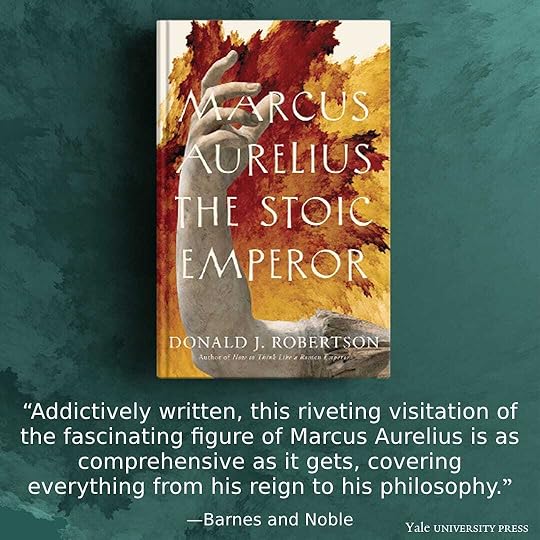
We look forward to seeing you there. Please invite your friends!
Thanks, as always, for your support!
Donald Robertson
Thank you for reading Stoicism: Philosophy as a Way of Life. This post is public so feel free to share it.
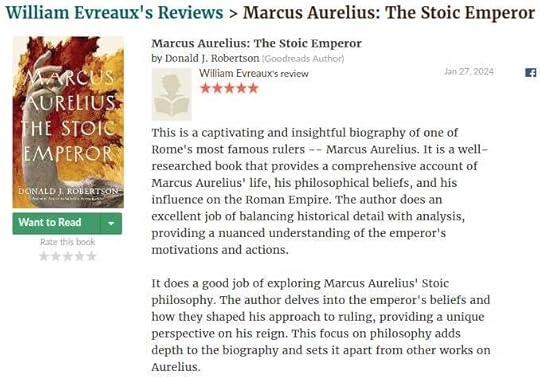
January 30, 2024
From the Mother of Caesar
This is an excerpt from my forthcoming biography Marcus Aurelius: The Stoic Emperor, published by Yale University Press as part of their Ancient Lives series. Available for preorder now in hardback and ebook formats from Amazon, Barnes and Noble, and all good bookstores. (I narrated the audiobook myself, which will be available soon.)
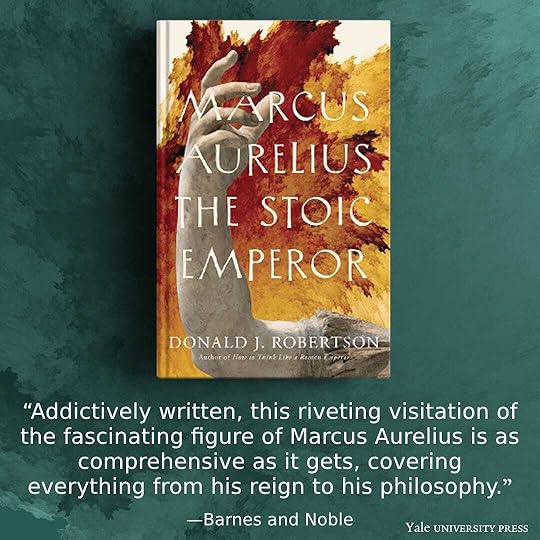 Chapter 1: The Mother of Caesar
Chapter 1: The Mother of Caesar“Piety and kindness,” writes his frail hand, listing qualities the author learned from his mother, “and abstinence not only from evil deeds, but even from evil thoughts.” Marcus Aurelius is in his fifties. It is late at night and the frigid winter air of Aquincum (modern-day Budapest) has brought on his familiar hacking cough. As usual, he has difficulty sleeping. Outside the praetorium, his headquarters at the center of the legionary fortress, everything is deceptively silent. The Praetorians, his personal regiment, are camped in nearby barracks. The whole empire has been devastated by a horrific pandemic, which would eventually be named the Antonine Plague, after Marcus Aurelius Antoninus’s imperial dynasty. The First Marcomannic War still rages along the Danube frontier. The army is exhausted from fighting one battle after another against the enemy tribes, the Quadi and Iazyges, on t he other side of the river. In the midst of all these troubles, the emperor is writing his personal notes on the application of Stoic philosophy. He pauses momentarily to gaze upon a wood-panel portrait of Lucilla, his mother. Slowly turning over the lesson that he learned from her half a century earlier, he must have asked himself, How can a man learn to abstain even from the very thought of doing wrong?
Stoicism: Philosophy as a Way of Life is a reader-supported publication. To receive new posts and support my work, consider becoming a free or paid subscriber.
Domitia Lucilla, also known as Domitia Calvilla, gave birth to her first child, Marcus Annius Verus—the future Roman emperor Marcus Aurelius—on April 26, 121 CE. His only sibling, a sister named Annia Cornificia Faustina, arrived a year later. The children were born into a wealthy patrician family with close ties to Hadrian, the ruling emperor. Later, Marcus would study under several of Rome’s finest rhetoricians and philosophers, but Lucilla, his mother, would have been his first teacher.
She also taught him to pay close attention to his thoughts and look deep within himself, examining his own motives and values.
They were clearly very close. Long before Marcus began any formal education, his mother had sown within him the seeds of a love for Greek literature and philosophy. She also taught him to pay close attention to his thoughts and look deep within himself, examining his own motives and values. Doing good outwardly is not enough; the real goal of life is to be good in ourselves.
“Look within. Within is the fountain of good, and it will ever bubble up, if you will ever dig.”
Lucilla’s early concern with moral self-examination bore fruit for her son throughout his life, but most notably decades later, when he began writing the Meditations.
“My little mother,” Marcus calls her affectionately in his letters, but she must have commanded great respect as one of the wealthiest and most powerful women in Rome. From her parents she had inherited extensive clay fields, and a large brick-and-tile factory on the banks of the Tiber, which had produced the materials used in the construction of the Colosseum, Pantheon, and Market of Trajan. Archaeologists have unearthed many bricks with her name stamped on them; it would appear that Marcus’s “little mother” was one of the leading magnates of the Roman construction industry at the start of the second century CE. Marcus admired her exceptional generosity (today we would call her a philanthropist), and he later expressed gratitude that thanks to her he had the resources to help those who were short of money or needed other forms of assistance.
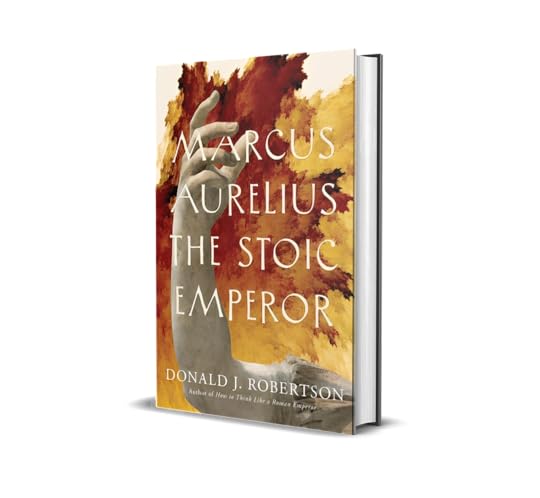
Marcus grew up around his mother’s circle of friends, who included some of the leading intellectuals in the empire. Lucilla was a natural Hellenophile. Indeed, her side of the family claimed descent from a legendary king, Malemnius, who founded a prominent city on Italy’s Salentine peninsula, Lupiae, where Greek colonists had settled in the distant past. (The surrounding region to this day retains strong cultural ties to Greece.) Roman Hellenism ran in her veins, and she was known for her exceptional grasp of the Greek language. Fluency in Greek had been fashionable since the latter part of Nero’s reign, half a century earlier, when Rome experienced the renaissance in the appreciation of Greek culture known as the Second Sophistic. The Sophists were Greek orators who discussed literature with their students but also claimed to impart moral lessons about virtue. Hence, the word sophistication , the quality that the parents of young Roman nobles hoped their sons might acquire from foreign intellectuals. Although most wealthy Romans at this time were bilingual in the two languages, Lucilla’s exceptional mastery of Greek is evident. Marcus Cornelius Fronto, the preeminent Latin rhetorician of his day, wrote letters in Greek addressed “To the Mother of Caesar” and somewhat pathetically begged Marcus to proofread one: “I have written your mother a letter, such is my assurance, in Greek, and enclose it in my letter to you. Please read it first, and if you detect any barbarism in it, for you are fresher from your Greek than I am, correct it and so hand it over to your mother. I should not like her to look down on me as a goth.”
Thank you for reading Stoicism: Philosophy as a Way of Life. This post is public so feel free to share it.
January 27, 2024
Preview "Marcus Aurelius: the Stoic Emperor"
You can now preview the content of my forthcoming book Marcus Aurelius: The Stoic Emperor, courtesy of Google Books. Click this link or the button below to sneak a peek inside!
The book is available for preorder in hardback and Kindle ebook editions. The audiobook, which I narrated myself, will be available very soon. Please consider ordering your copies in advance. Doing so not only helps me get it into more retailers but also means you may save money through Amazon’s preorder price guarantee. Thanks!
Special DiscountNEW: My publisher, Yale University Press, has generously agreed to offer a whopping 30% discount to you, my Substack Subscribers, when you pre-order Marcus Aurelius: The Stoic Emperor. Simply click the pre-order button and at the checkout enter the coupon code Y24AURELIUS to claim 30% off. This offer is valid now, and until February 5th, 2024. (NB: This offer is only available to orders placed on the Yale website for delivery to the US or Canada.)
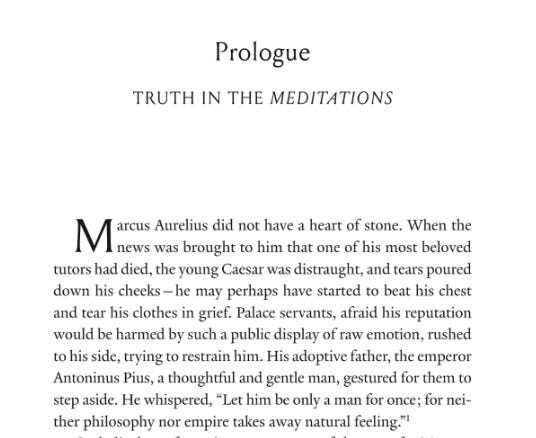
Stoicism: Philosophy as a Way of Life is a reader-supported publication. To receive new posts and support my work, consider becoming a free or paid subscriber.
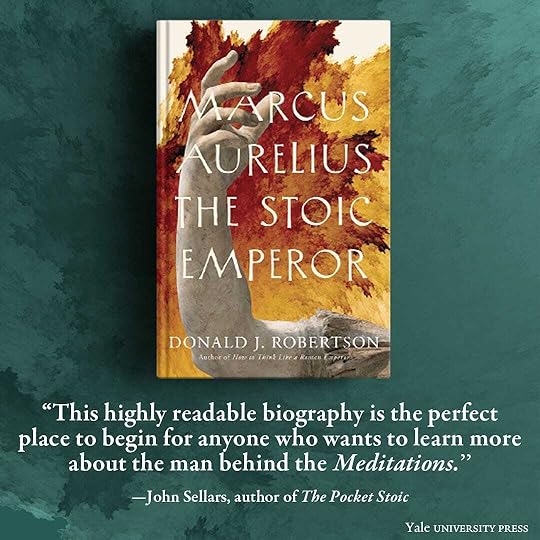
Thank you for reading Stoicism: Philosophy as a Way of Life. This post is public so feel free to share it.

January 23, 2024
Overview of "Marcus Aurelius: The Stoic Emperor"
In this episode, I read an exclusive excerpt from my latest book, Marcus Aurelius: The Stoic Emperor, published by Yale University Press, as part of the Ancient Lives Series. The book is a philosophical biography of the Roman emperor, which contains many references to the Meditations and how his philosophy shaped his life. You can help it reach a wider audience by pre-ordering now from Amazon, Barnes and Noble, or any other bookseller.

While the First Marcomannic War was raging, Marcus Aurelius, surrounded by death and betrayal, found consolation in writing his famous notes “to himself” on Stoic philosophy. He also made a solemn vow. If he survived long enough, he would go on pilgrimage to Athens and join the supplicants being initiated in the Temple of Demeter at nearby Eleusis. Hadrian had tried to bring the Eleusinian Mysteries to Rome, but their mystique was rooted in the Greek temple’s ancient site.
Stoicism: Philosophy as a Way of Life is a reader-supported publication. To receive new posts and support my work, consider becoming a free or paid subscriber.
NEW: My publisher, Yale University Press, has generously agreed to offer a whopping 30% discount to you, my Substack Subscribers, when you pre-order my new book Marcus Aurelius: The Stoic Emperor. Simply click the pre-order button and at the checkout enter the coupon code Y24AURELIUS to claim 30% off. This offer is valid now, and until February 5th, 2024. (NB: Offer only available to orders placed on the Yale website for delivery to the US or Canada.)
 Praise from other Authors
Praise from other Authors“Few historical figures are as fascinating as Marcus Aurelius, the emperor-philosopher. And few writers have been so effective at bringing his complex life and character to the attention of modern readers as Donald Robertson.”—Massimo Pigliucci, author of How to Be a Stoic: Using Ancient Philosophy to Live a Modern Life
“Robertson has written a very thorough and very readable account of Marcus’s life and the events and people that shaped him. Anyone who wants to understand the author of Meditations should read this book.”—Robin Waterfield, author of Marcus Aurelius, Meditations: The Annotated Edition
“Donald Robertson guides us into the world of a philosopher-emperor whose humility and Stoic teachings fill the pages. We are indebted to Robertson for this wonderful account of the emperor who penned notes to himself while in battle that would be later known as the Meditations and read by millions for philosophical inspiration. Simply spellbinding.”—Nancy Sherman, author of Stoic Wisdom: Ancient Lessons for Modern Resilience
“This highly readable biography is the perfect place to begin for anyone who wants to learn more about the man behind the Meditations.”—John Sellars, author of The Pocket Stoic
“Robertson’s biography provides a compelling narrative of Marcus’ life, carefully based on the primary sources. He brings out very clearly the life-long significance of Stoicism for Marcus and the interplay between philosophy, politics, and warfare.”—Christopher Gill, author of Learning to Live Naturally: Stoic Ethics and Its Modern Significance
Thank you for reading Stoicism: Philosophy as a Way of Life. This post is public so feel free to share it.
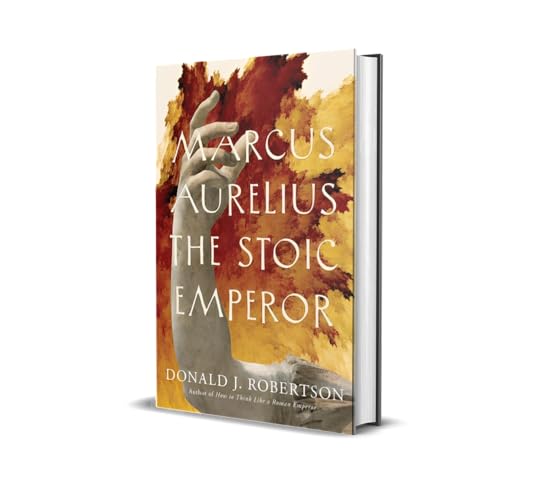
January 19, 2024
Win a copy of "Marcus Aurelius: The Stoic Emperor"
My publisher, Yale University Press, just told me that they’ve created a special Goodreads Giveaway for my forthcoming biography, Marcus Aurelius: The Stoic Emperor. The have generously agreed to give away 25 free advance review copies of the book. (NB: This offer is only available currently in the US.) Some advance reviewers have already posted ratings and the book currently has 4.67 stars on Goodreads.
You can enter until 27th Jan. The book’s release date is 6th Feb 2024.
Win an Advance Review Copy: Experience the world of Roman emperor Marcus Aurelius in the latest addition to our Ancient Lives series.
If you’re based outside the US, please stay tuned for other offers. In the meantime, check Amazon in your region for their preorder price guarantee offer.
Thank you for reading Stoicism: Philosophy as a Way of Life. This post is public so feel free to share it.
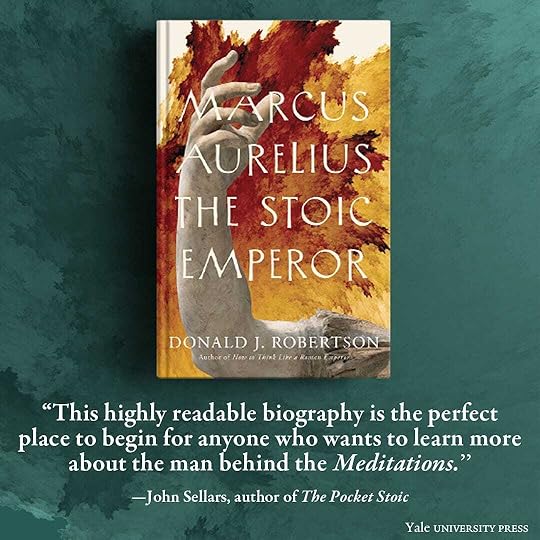
Stoicism: Philosophy as a Way of Life is a reader-supported publication. To receive new posts and support my work, consider becoming a free or paid subscriber.



